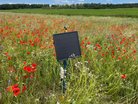Cranswick and AgriSound Partner for Carbon Insetting

In a move that signals a wider shift in approach to achieving net zero, one of the UK’s largest food producers has joined forces with an innovative agritech firm to help it meet its net zero targets.
Cranswick is a leading UK food producer and AgriSound is an AI agtritech startup.
The aim is for Cranswick to achieve Net Zero by 2040 through internal process improvements rather than traditional carbon offsetting methods, such as purchasing carbon credits or investing in external projects like reforestation or renewable energy to compensate for emissions.
Instead, Cranswick plans to use AgriSound’s bioacoustics listening technology.
Bioacoustics listening technology uses audio recording devices to capture and analyse animal sounds for studying biodiversity and ecosystem health.
It will monitor local biodiversity, providing real-time data on the effectiveness of nature-based solutions including wildflower planting to verify the success of the Carbon Insetting Scheme.
Cranswick hopes benefits of the partnership, include:
- A clear picture of its positive effects on nature and biodiversity.
- Reduced carbon emissions within its the supply chain.
- Increased farmer revenue through higher crop yields and lower production costs.
Cranswick revolutionising sustainability in food production
The partnership is a wider marker of a shift in how food producers are approaching sustainability.
By integrating nature-based solutions within their supply chain, Cranswick is setting a new standard for carbon reduction in the industry.
AgriSound's bioacoustics listening technology, particularly the Polly listening device, will play a crucial role in verifying the quality of Cranswick's insetting activities.
This innovative approach comes at a time when traditional carbon offsetting schemes face increasing scrutiny.
The Carbon Insetting Scheme offers a more transparent and effective 'at source' solution, addressing concerns about greenwashing in the industry.
Cranswick’s economic benefits and industry-wide impact
Cranswick's Carbon Insetting Scheme is also designed to create additional revenue streams for its production supply chain.
Farmers will receive financial incentives for enhancing biodiversity through practices such as planting wildflowers and flower-rich grasses.
This approach not only improves environmental outcomes but also supports farmers during economically challenging times.
The project's scope additionally extends beyond Cranswick, with plans to share the blueprint for the Carbon Insetting Scheme with the wider agri-food industry.
This move could potentially transform sustainability practices across the sector, creating a significant commercial opportunity for technology providers while driving environmental gains.
Ash Gilman, Director of Agricultural Strategy at Cranswick says: “We’re committed to ensuring this collaborative project will be able to verify the reduced carbon emissions within Cranswick's agricultural supply chain, quantifying improvements in biodiversity, while at the same time financially rewarding our producers for their environmental efforts.”
He continues: “We are determined that by being able to verifiably demonstrate our leveraging of nature-based solutions, this Carbon Insetting Scheme will keep us solidly on track to zero carbon emissions by 2040. And by sharing the blueprint for the scheme within the wider agri-food industry, we hope to set a new standard for the adoption of sustainability within it.”
Casey Woodward, founder and CEO of AgriSound, concludes: “As well as helping significantly improve biodiversity on its farms and ultimately providing increased income for its producers, the scheme is set to be an industry leader in using nature-based solutions and ag-tech data to prioritise the environment. So, the planet wins too – which has to be the ultimate aim.”
--------------
Make sure you check out the latest news at Food Digital, a BizClik brand.
Featured Articles
Fresh investment supports TRACT in enhancing tools for sustainability in the food and agricultural sectors, aligning with EU regulations
The devastating floods in Spain have shaken up the global citrus supply, heightening challenges in the fruit juice drinks market
McDonald's has spent 40 years supporting students with scholarships & plans to continue, despite Robert F. Kennedy Jr.’s plan to Make America Healthy Again




